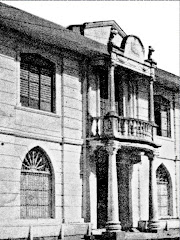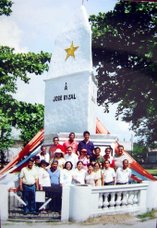Tribute to the Massacred Journalists in Maguindanao
This is a reprint of today's article of Patricia Evangelista of Philippine Daily Inquirer and Executive Producer of ANC's StoryLine.
Carnage
MAGUINDANAO, Philippines—This is a story about death in a place they call the Promised Land, where the heat punches with a sweaty fist, and a crescent moon rises with the Christian sun.
It happened on a lonely hill in a quiet town, where every bridge is a checkpoint manned by young men in fatigues. Esmael Mangudadatu, Buluan vice mayor, threatened with violence, sending his wife Genalyn, his sister, his nieces and his lawyers to file his certificate of candidacy because he believed women would be safe. Esmael Mangudadatu, inviting a pack of journalists to cover the event, because he believed his family would be safe where the media were. Esmael Mangudadatu, answering the last phone call from a wife who told him they had been stopped by Datu Unsay Mayor Andal Ampatuan Jr.’s private army.
Witnesses say they heard the gunshots. “Ra-ta-ta-ta-tat,” says the barefoot man with the face browned by sun. He heard it, at ten in the morning. Ra-ta-ta-ta-tat. He says it did not last long.
A road, winding past clapboard carwashes and houses of crosshatched palm, bamboo fences trailing soft pink blossoms. A sky, blue, sweeping over sprawling green. A cliff-side, under a yellow sun. This is where they were found, men and women, Mangudadatu’s caravan of untouchables, bleeding into the dry earth, some still sitting inside the white vans with doors flung open. One by one, the others are dug out of a great gaping pit. Bodies, buried in tiers six deep, bloated huge and white, shirts browned by blood, pants bunched at the knees, faces like mashed clay. They unearth a UNTV van, a red Toyota Vios, a crumpled Tamaraw FX. The investigators offer what dignity they can. Newspapers are laid over faces, over crotches, over dirt-encrusted stomachs swollen to the size of overripe watermelons. Some of the dead once wrote for the papers covering their heads.
The flies flock over the bodies. A young man from UNTV stands over the six new corpses. He is looking for his friends, he says. When he finds them, he steps back and watches a drinking buddy wrapped in sheets of red plastic, secured by masking tape, hauled up on a stretcher. The smell of dead stretches down the hill. A backhoe sits at the bottom, one long arm stamped with “Province of Maguindanao.”
Witnesses say they saw armed men, more than 50, walking down the hill, off to the direction of Shariff Aguak, Maguindanao’s provincial capital—where the sprawling peach-and-pink mansions of Andal Ampatuan Sr. and his son Andal Jr. face each other on a street littered with soldiers, on the same street of the enormous peach-and-pink capitol building. It was the capitol where Presidential Adviser for Mindanao Jesus Dureza landed his two helicopters to pick up Andal Jr., the same Dureza who waited for Andal Jr. to “voluntarily come in for questioning.” Of the Ampatuans, Presidential Spokesperson Lorelei Fajardo says that “just because they’re in this situation doesn’t mean we will turn our backs on them,” as if this government has ever had any compunction about turning its back on allies. This is what an “appalled and outraged” president does when the last democratic institution is gunned down on a public road: she offers government helicopters and permits a suspect to ride a private plane, allows evidence to disappear while suspects twirl their guns, lets her executive secretary appeal to suspected murderers to “surrender to authorities” instead of insisting they be ripped out of their holes, and then she expects the nation to applaud her like her moronic deputies.
Fifty-seven (according to the Armed Forces of the Philippines) were murdered last Monday. Thirty of them belonged to the media, 30 men and women whose presence in this benighted country has become the one assurance that the worst will not happen. No guns will be drawn while a camera rolls, but even that safety is gone. Not once in the history of journalism has carnage like this happened to so many. There are no more rules, no lines left to cross. The government would like to give Andal Jr. his dignity, they want to make sure he is treated fairly, they trip over their own tangled lies for his sake. And yet there was no dignity left in the men and women found bloated and half-naked in Sitio Masalay, stripped of notebook and camera and wallet, stripped of face and name, until some unfortunate daughter recognizes Papa’s shirt or Mama’s pants.
Remember their names. Benjie Adolfo, Gold Star Daily. Henry Araneta, Radio dzRH. Mark Gilbert “Mac-Mac” Arriola, UNTV. Rubello Bataluna, Gold Star Daily. Arturo Betia, Periodico Ini. Romeo Jimmy Cabillo, Midland Review. Marites Cablitas, News Focus. Hannibal Cachuela, Punto News. John Caniban, Periodico Ini. Lea Dalmacio, Socsargen News. Noel Decina, Periodico Ini. Gina Dela Cruz, Saksi News, General Santos City. Eugene Dohillo, UNTV. Jhoy Duhay, Gold Star Daily. Santos Gatchalian, dxGO. Bienvenido Legarte Jr., Prontiera News. Lindo Lupogan, Mindanao Daily Gazette. Ernesto “Bart” Maravilla, Bombo Radyo. Rey Merisco, Periodico Ini, Koronadal City. Reynaldo “Bebot” Momay, Midland Review. Marife “Neneng” Montaño, Saksi News. Rosell Morales, News Focus. Victor Nuñez, UNTV. Ronnie Perante, Gold Star Daily. Joel Parcon, Prontiera News. Fernando “Rani” Razon, Periodico Ini. Alejandro “Bong” Reblando, Manila Bulletin. Napoleon Salaysay, Mindanao Gazette. Ian Subang, Socsargen Today. Andres “Andy” Teodoro, Central Mindanao Inquirer.
There were threats against the media in the days after the massacre. But on the day they ripped swollen bodies out of Ampatuan soil, there were photojournalists lining the crest of the cliff like an honor guard, long lenses glinting in the sun. There was a cameraman who stepped away from a tripod to wipe away tears, a veteran in an orange hat with an arm around an orphan. It was both tribute and promise.
This is what the men who fired those machine guns last Monday did not know: that there is no journalist today who will not stand for those who were lost. Remember what happened here, on a lonely hill in a quiet town, where a blue sky sweeps over sprawling green. Remember Ampatuan, and remember their names.
* * *
This piece could not have been written without the generosity and support of the following people: Carol Arguillas, Mindanews, Rowena Paraan and Nonoy Espina of the National Union of Journalists of the Philippines, and Romel Bagares of CenterLaw Philippines. Many, many thanks.










